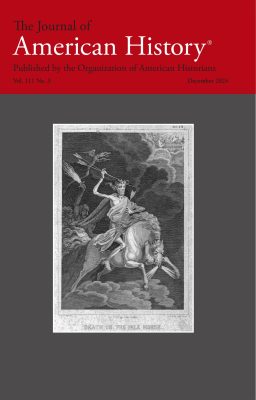The December problem of the Journal of American Historical past is now accessible on-line and in print. Included are articles by Trent MacNamara, Tracey Deutsch, Natasha Zaretsky and Aaron Corridor’s Editor’s Selection article, “Bad Roads: Building and Using a Carceral Landscape in the Plantation South.” The articles cowl a variety of subjects, together with imaginings of the heavens within the early United States, Julia Baby and the gendered labor of domesticity, the connection between highway infrastructure and policing slavery, and fatigue and dealing motherhood within the Eighties. The difficulty additionally options Anthea Hartig’s 2024 OAH Presidential Tackle, in addition to digital historical past, e book, and film opinions.
Previews
In her presidential tackle to the 2024 annual assembly of the Group of American Historians, Anthea M. Hartig, the Elizabeth MacMillan Director of the Smithsonian Nationwide Museum of American Historical past, argues that regardless of a long time of activism and historic analysis, ladies’s “lives, accomplishments, our bodies, and futures matter much less,” main Hartig to ask, “The place Have All of the Ladies Gone?” Ladies, in brief, are ignored. By sharing a few of the tasks Hartig labored on on the California Historic Society and the Nationwide Museum of Historical past, Hartig calls on us to “assum[e]feminine presence—and go discover them.”
In 1800, the skies dominated. For many Individuals, nice issues got here from above. Climate originated within the heavens. Fates had been written there. Celestial actions foretold earthly occasions. A watchful, manlike God resided simply past view. Purity and justice loomed. On a regular basis life had a basic third dimension. Trent MacNamara charts this dimension in an essay on the connection of common areas to common concepts. He asks: The place do we discover transcendence? Who owns the world past? How have the heavens formed life on earth?
Numerous earthen frequent roads lay on the coronary heart of on a regular basis governance and the enforcement of slavery within the plantation South. By means of a ground-up historical past of highway administration and policing, Aaron Corridor exhibits how public energy each produced and delimited particular person planter energy to manipulate enslaved residents. Winding round estates and wilds, dangerous southern roads organized the panorama right into a matrix of personal plantation jurisdictions. Their upkeep spurred essentially the most participatory dimension of native authorities, as myriad native officers took cost of enslaved crews summoned by the state. These roads grew to become a realm of precarious mobility that channeled enslaved customers, they usually supplied the first infrastructure for standard policing and formal patrolling of plantation area.
Whereas right this moment we would take foodism and gourmand cooking as routine cultural practices, within the mid-twentieth-century United States, this was removed from a forgone conclusion. Tracey Deutsch exhibits how Julia Baby reframed laborious, elaborate cooking as a middle- and even upper-class exercise. Relatively than inward-focused household dinners overseen by considerate wives and moms, these meals had been outward going through—methods to welcome different {couples}, and new concepts, into one’s house. For Baby and rising numbers of house cooks, cooking got here to be understood as so essential that it lay outdoors ladies’s realm, and therefore outdoors the realm of labor in any respect.
Through the Eighties, the US transitioned to a dual-earner economic system during which most moms of younger kids labored for wages outdoors the house. Confronted with the problem of balancing wage labor and household obligations, working moms had been advised that they wanted to preserve, handle, and make investments their bodily and psychic energies correctly. All through the last decade, employers, advertisers, physicians, psychologists, and health and eating regimen gurus waged battle on ladies’s fatigue. Natasha Zaretsky examines this marketing campaign and explains the way it up to date American beliefs of self-improvement and repurposed them to painting particular person vitality administration as the answer to the challenges posed by working motherhood in Eighties America.
